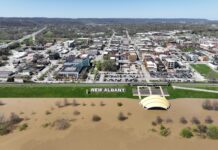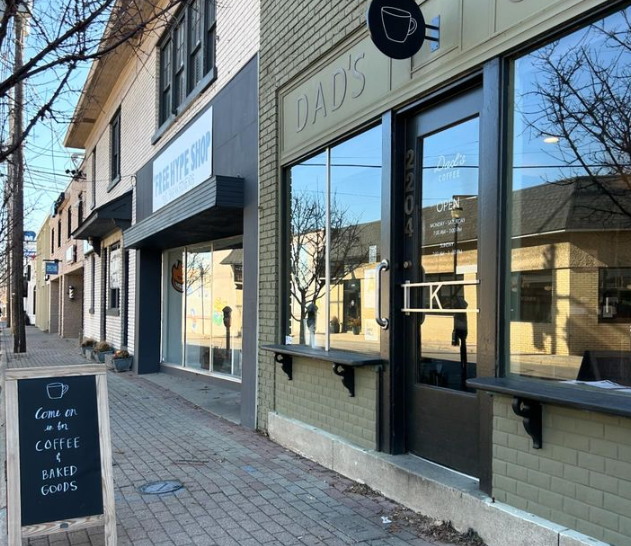“Edibles & Potables” is our Sunday morning slot for stories that range beyond our metropolitan Louisville coverage area.
Dad’s Coffee, located at 2204 Dundee Road in the Highlands, will close on April 27.
While the loss of an independently-owned coffee shop is regrettable — trust me, I know what it’s like to suffer while shuttering a dream — it’s not exactly an unprecedented occurrence. In this instance I was struck by a comment from Dad’s co-owner Matt Grammer, which strikes me as a jumping off point for further examination.
First, the nuts and bolts, and then those dreaded teaching moments.
Dad’s Coffee in the Highlands to close after less than two years in business, by Michael L. Jones (Louisville Business First)
Matt Grammer, a co-owner of Dad’s Coffee, said foot traffic alone wasn’t enough to sustain the coffee shop.
“We’re sad to close Dad’s Coffee but the business model just doesn’t work with the customer volume we have,” Grammer explained. “I think a drive-thru is needed to pay baristas a good wage, but since we’re dependent on neighborhood traffic, our wage model is unsustainable, and we decided to close instead of underpaying our great staff.”
Dad’s Coffee took over the space previously occupied by the Breadworks bakery, which closed in late 2022 after a run of 27 years, posting this explanation on social media.
“We have withstood much adversity over the years but the pandemic, frustrating labor shortages, equipment issues and huge increases in ingredient and supply costs have proved much too much to overcome.”
Breadworks didn’t mention the absence of drive-thru service, leading me to surmise that existing parking was sufficient for its patrons to tend to their bakery pickup needs by going inside the building. Conversely, long before COVID it seems to have become established that without a drive-thru configuration, many coffee purveyors faced problems; the same is true for fast food outlets.
Last year the Courier Journal’s Matthew Glowicki obliquely addressed this phenomenon.
Why are drive-thru only coffee shops suddenly popping up all over Louisville?
“Quick service specialty coffee and tea outlets are growing like crazy across the country,” said David Portalatin, food industry advisor with market research company, Circana.
Partially fueled by pandemic-influenced consumer trends toward carry-out and mobile ordering and partially a mirroring of a culture looking for convenience, drive-thru only coffee shops are gaining in popularity in markets across the country, Louisville included.
Obviously one possible translation of “quick service specialty coffee and tea outlets” is “welcome, chain and franchise operators,” and we’ve noted a few of them (7 Brew, Scooter’s) right here at F&D.
As surveyed by Glowicki, their entire reason for existence is small size (in the case of 7 Brew, the shops are pre-fabricated and installed, as opposed to “built”) and in terms of access, they’re overwhelmingly oriented as drive-thrus.
Walk-up? In complete honesty, I’m not sure that is even possible. The larger point is this: There’s nothing new here, only a logical conclusion stemming from decades of drive-thru proliferation. I can recall conversations 15 years ago with Mike (Heine Brothers) Mays, who at the time was saying that future Heine locations without a drive-thru were almost inconceivable to him.
Speaking for myself (as is my habit), the next cup of coffee I purchase via a drive-thru likely will be my first. I can’t remember ever doing it, partly from an innate and contrarian stubbornness, but also because as an adult, for various reasons pertaining to the way I’ve tried to organize my life, I’ve consistently driven far fewer miles annually than the average American.
I have not commuted long distances, “lived” from my car, or had children to transport while craving a “Trenti iced coffee, 12 pumps [sugar-free] vanilla, 12 pumps [sugar-free] hazelnut, 12 pumps [sugar-free] caramel, 5 pumps skinny mocha, a splash of soy, coffee to the star on the siren’s head, ice, double-blended.”
Rather, I’m that guy, the one who’ll park in front of the big box and walk a hundred yards across sizzling suburban asphalt to stand in the same line with the queued-up SUVs, get my double espresso, shoot it, and take a bow before limping away to towel down.
For at least some of us, the larger issue is how American drive-thru culture has impacted the built environment in deleterious ways, and I’ll provide three links for further reading that amplify these considerations.
First, curb cuts.
Death by a Thousand Curb Cuts, at Twin City Sidewalks
I was thinking about this the other day when I was going to my bank, watching the interaction between the drive-through window and the well-people’d sidewalks of Grand Avenue. It seems like a very precarious situation: on the one hand, cars crawling three abreast through the pneumatic-tubed drive-in lanes; on the other hand, walkers and elderly people and baby carriages and bicycles and strolling shoppers walking directly in front of these cars, tempting the curb-cut predators with their tender, juicy pedestrian bodies. Even if there are no accidents, its certainly an inconvenience for Grand Avenue street life.
Then, “stacking” cars.
The ins and outs of drive-thrus, and why they’re bad for cities, by Bill Lindeke (MinnPost)
The primary concern for the neighborhood group is that the drive-thru proposal won’t do anything to improve the surrounding neighborhood, and that it might cause massive traffic headaches at the busy intersection. Indeed, the developer has gone through multiple revisions with MnDOT and the city, trying to figure out just how many left-turn lanes and how much “stacking” (i.e. spaces where cars can idle as they queue up) the spot will require.
And, a catch-all summary.
Drive-thrus are creating problems for cities and towns, by Nathaniel Meyersohn (CNN)
Magnets of traffic and congestion, drive-thrus discourage walking, public transit use and visits to neighboring businesses. They also lead to accidents with pedestrians, cyclists and other cars, and contradict the environmental and livability goals of many communities.
snip
Drive-thrus don’t “support any of the life and vitality and amenities that suggest people might want to come live, work or play in a neighborhood,” said David Dixon, an urban places fellow at design and planning firm Stantec. “Drive-thrus belonged to a much more auto-centric world.”
Alas, we hold these truths to be self-evident; that all men (and women) are created equal so long as they have cars — and Louisville is about as auto-centric as America gets, so in closing, and unsurprisingly, among us exist considerable pockets of drive-thru worship, extending far beyond simple ease of consumer access to address that most patriotic of all realms: the profit motive.
Meet Utah’s Drive Thru City, which has all the products needed to set up your own drive-thru business, but also ideas for how investments might be directed: drive-thru liquor stores, funeral homes, health care clinics, art galleries, libraries, sex shops and so very much more.
Now it’s time to leave my car in the driveway, stroll over to our home model Saeco HD8911/48 Incanto Classic Milk Frother Super Automatic Espresso Machine, and get my obtuse *** caffeinated for Sunday morning reading.
























